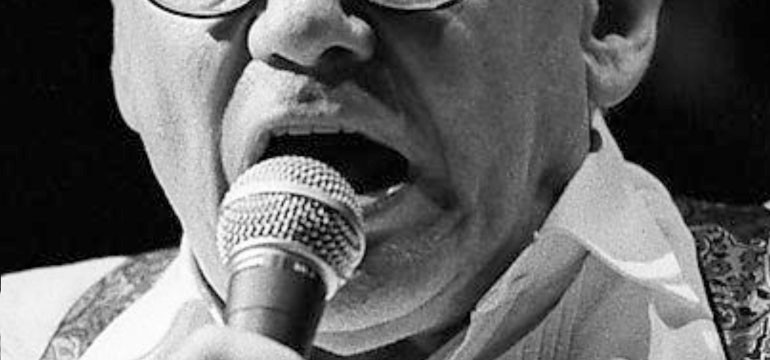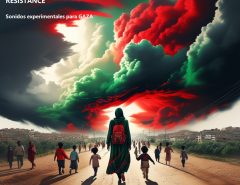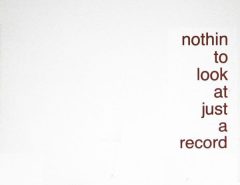The PROBES Auxiliaries collect materials related to each episode that try to give a broader – and more immediate – impression of the field. They are a scan, not a deep listening vehicle; an indication of what further investigation might uncover and, for that reason, most are edited snapshots of longer pieces. We have tried to light the corners as well as the central arena, and to not privilege so-called serious over so-called popular genres. This auxiliary listens to voices, mostly in groups, doing extraordinary things.
[audio:http://rwm.macba.cat/uploads/downloader.php?fichero=/uploads/probes/probes11-2-chris-cutler.mp3]01. Playlist
00:00 Programme icon
Gregorio Paniagua, ‘Anakrousis’, 197800:05 Karlheinz Stockhausen, ‘The Orchestra Strike’, 1984
From a performance of ‘Luzifers Tanz’ – part of ‘Samstag aus Licht’ – recorded at La Scala, Milan in 1984.01:56 Donald Macleod (Portree and Scalpay), gaelic psalm singing (excerpt), recent
A hymnal form with its origins in the rise of sixteenth century Scottish Protestantism, which abandoned Latin for native language and encouraged personal as well as institutional religious expression. A call and response form (since many worshippers were unable to read) in which each line is sung first by the precentor with the congregation then joining in at their own tempi with or without ornamentation, respecting the line but singing it in their own way and at their own speed.03:14 William Brittelle, ‘Amid the Minotaurs’ (excerpt), performed by Roomful of Teeth, 2012
Britelle (born 1976) describes himself as a post-genre composer, generally of electro-acoustic music, whose primary mentors include Mike Longo, pianist/arranger for Dizzy Gillespie, neo-romanticist composer David Del Tredici and punk guitarist Richard Lloyd of Television.05:19 David Bedford, ‘Some Bright Stars for Queen’s College’ (excerpt), 1970
For 80 girls’ voices and 27 plastic twirlers. David Bedford led multiple musical lives producing works for children and amateurs, orchestras and contemporary ensembles, as a composer of avant garde pieces, a working member of Kevin Ayers’ Whole World and as a performer and arranger for Mike Oldfield, Roy Harper, Elvis Costello and a string of interesting rock ensembles.06:48 The Residents, ‘The Angry Angakok’ (excerpt), 1979
A group born of – and sustained by – recording technology, The Residents flew a great many probes, testing the possibilities of instruments, voices, processing and methods of assembly, almost always in song form.08:56 Charlie Morrow, ‘Breath Chant’ (excerpt), 1971
Composer, installation artist, maverick, pop arranger and sound designer, Charlie Morrow turns up in the unlikeliest places. Do we see a pattern? Many people with their feet in many camps.10:58 The Beach Boys, backing vocals from ‘Do you Like Worms’ from the unreleased ‘Smiley Smile’ sessions (excerpts), 1966
A pop master of polyphony, Wilson developed increasingly complex parts for voice that were often sunk into full instrumental arrangements; here are some of them with the rest of the song muted.12:01 Joan La Barbara, ‘Erin’ (excerpt), 1980
A classically trained singer, Joan La Barbara (born 1947), has specialised in
Experimental techniques, circular breathing, multiphonics and timbral manipulation. Many works have been composed for her by American sixties composers and she has produced a library of works of her own, often including electronics and multiple voices.15:33 The Mothers of Invention, ‘It Can’t Happen Here’ (excerpt), 1967
Zappa, a musical polymath, autodidact, virtuosic instrumentalist and singer ignored all borders in pursuit of a music that mixed complexity, contemporary compositional techniques, rock, pop, jazz, free jazz, noise improvisation, electronics, and the full range of electric and acoustic instruments, skipping from high art to cheap Vegas soft porn with no apology or explanation. In this early recording (one of the first rock double LPs) LP 2 was filled mainly with structured improvisation, dominated by voices.17:53 Elton Britt, ‘Chime Bells’ (excerpt), 1934
Yodeling came into American country music in the mid twenties, mainly through the recordings of blues and country singer Jimmie Rogers. Only later did it become indelibly identified with cowboy music. Probably the greatest – and most bravura – yodeling hit, was this, by Elton Britt, a follower of Rogers’, adapted from the English singer Harry Torrani’s ‘Happy And Free Yodel’.19:39 Mauricio Kagel, ‘Rrrrrrr…’ (extract) 1981
Taken from the a cappella section of the Argentinian composer Mauricio Kagel’s ‘Rrrrrrr…’ a work produced for radio comprised of 41 autonomous pieces – variously for choir, percussion, winds, basses and percussion, jazz ensemble or solo voice. All sections begin with the letter R, in this case – and unusually – the rolled R – the alveolar trill; a kind of percussive tremolo for voice) here chorally deployed.20:48 Steve Sidwell and The Hollywood Film Chorale Sound Effects Choir (aka The Honda Choir), advertiser’s announcement, 2006
Essentially this is a mass folie work except all the sounds are made by a sixty strong choir using their bodies or their voices.22:39 Michael Reudenbach ‘Kommen’ (extract), 2001
For five voices, using elements of the word “kommen”, constructed on a scheme derived from the DNA sequence. A student of Lachenmann and Spahlinger, Reudenbach’s works are few, and finely focused.24:52 Paul Dutton ‘Antilyric’, 2007
Canadian singer with a background in folk and blues and a longtime member, with Michael Snow and John Oswald, of the improvising trio CCMC and more recently of Five Men Singing, with fellow experimentalists Jaap Blonk, Koichi Makaigami, Phil Minton and David Moss.26:50 Ernst Jandl, ‘schtzngrmm’, 1957
Born in 1925, and strongly influenced by the Dadaists, the Austrian writer and performer Ersnst Jandl’s work also encompassed visual- and sound-poetry, music theatre, experimental film and group performances; though he is still best known as a poet. He works a lot with word-play and lettriste schemata. ‘Schtzngrmm’ (from Schu?tzengraben: trench) draws its essence from the sounds of war formed through letters and phonemes.27:21 Meredith Monk, ‘Dolmen Music’, 1979
With roots in dance, folk and rock, Monk is a fully paid up member of the sixties American avant garde, best known for her vocal work (solo and with her own ensemble) based on the exploration of extended vocal techniques, though she has also written for orchestra and string quartet, transferring her ideas from voice to instruments. And She works in theatre and film.29:07 Furious Pig, ‘I Don’t Like Your Face’, 1980
Furious Pig were Cass Davies, Martin Kent, Stephen Kent and Dominic Weeks, a rock band from Totnes in Devon featuring the usual instruments. In 1979 they moved to London. Rehearsing – as some groups do in the absence of big soundproofed spaces – by just singing their various parts – they had a better idea, dropping the instruments and becoming a high energy a cappella ensemble – and a noteworthy addition to the London new wave/post punk musical environment of the time. They released one 12” single, shortly after which they disbanded.





Leave a Reply
Lo siento, debes estar conectado para publicar un comentario.